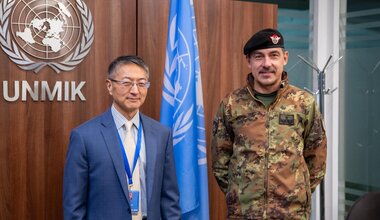9 Jun
2015
The Secretary-General Remarks at G7 working session on terrorism
REMARKS AT G7 WORKING SESSION ON TERRORISM, by the Secretary-General
8 June 2015 - I thank Chancellor Merkel for hosting this working session.
I am increasingly concerned by the spread of violent extremist groups and the malicious and hateful ideologies that are fuelling violence and terrorism around the world.
From the deadly ideologies of ISIL and Boko Haram, to Islamophobia and anti-Semitism, this wave of intolerance and hatred is a serious threat to peace, development, human rights and humanitarian action.
The two most pressing issues we need to address are the underlying contexts and drivers of violent ideologies, and the main threats that have emerged, such as foreign terrorist fighters.
During the last 15 years, most counter-terrorism efforts have been reactive, focusing largely on military and security measures.
This approach has often generated negative unintended consequences, further radicalizing disenfranchised communities.
I appreciate President Obama’s initiative to convene the White House Summit on Countering Violent Extremism (CVE) last February.
Based on that, the UN General Assembly President and I convened a High-level World’s Religious Leaders’ Meeting on this important issue.
Later this year, I will present a “United Nations Global Plan of Action to Prevent Violent Extremism” to the General Assembly.
The Plan will propose ways to address the causes of violent extremism, including intolerance, governance failures and political, economic and social marginalization.
The Plan will provide Member States with concrete recommendations for action at the local, national, regional and global levels.
Addressing violent extremism demands a proactive, “all-of-society” approach that includes minorities, women and youth as partners.
The targeting of women bears special mention. With every attack and encroachment by violent extremists, the first targets are the rights of women and girls.
Governments also have a particular responsibility to address the aspirations of youth, especially in countries where youth represent an increasing majority of the population.
Youth are the group most prone to radicalization and violent extremism. Most foreign terrorist fighters are young males aged between 15 and 35.
But young people are also part of the solution to preventing violent extremism. We all need to do a better job of engaging them.
Networks of young peacebuilders and activists confronting violent extremism will do more than any government programme.
Violent extremism is a fundamental threat to all countries and people.
The international community’s response will be effective only through coordinated, multilateral action.
Such cooperation is especially important in addressing the financing of terrorism, the vulnerability of so many borders, and the foreign terrorist fighter phenomenon.
We must also take special care not to exacerbate the problem.
Undoubtedly, security measures and even military action may be necessary to address the real threats posed by violent extremists.
But when counter-terrorism efforts ignore the rule of law and violate fundamental rights – which they do far too often -- they not only betray the values they seek to uphold, but can also end up further fuelling violent extremism.
In many place, certain groups of society, or entire communities, are targeted by security forces – sometimes brutally and disproportionately.
The only real effect of such actions is to increase still further the levels of bitterness, radicalism and extremism within the target communities.
Missiles may kill terrorists. But I am convinced that good governance is what will kill terrorism.
I remain fully committed to working with you in this common struggle of our time.
Thank you.
 UN
UN United Nations Peacekeeping
United Nations Peacekeeping





